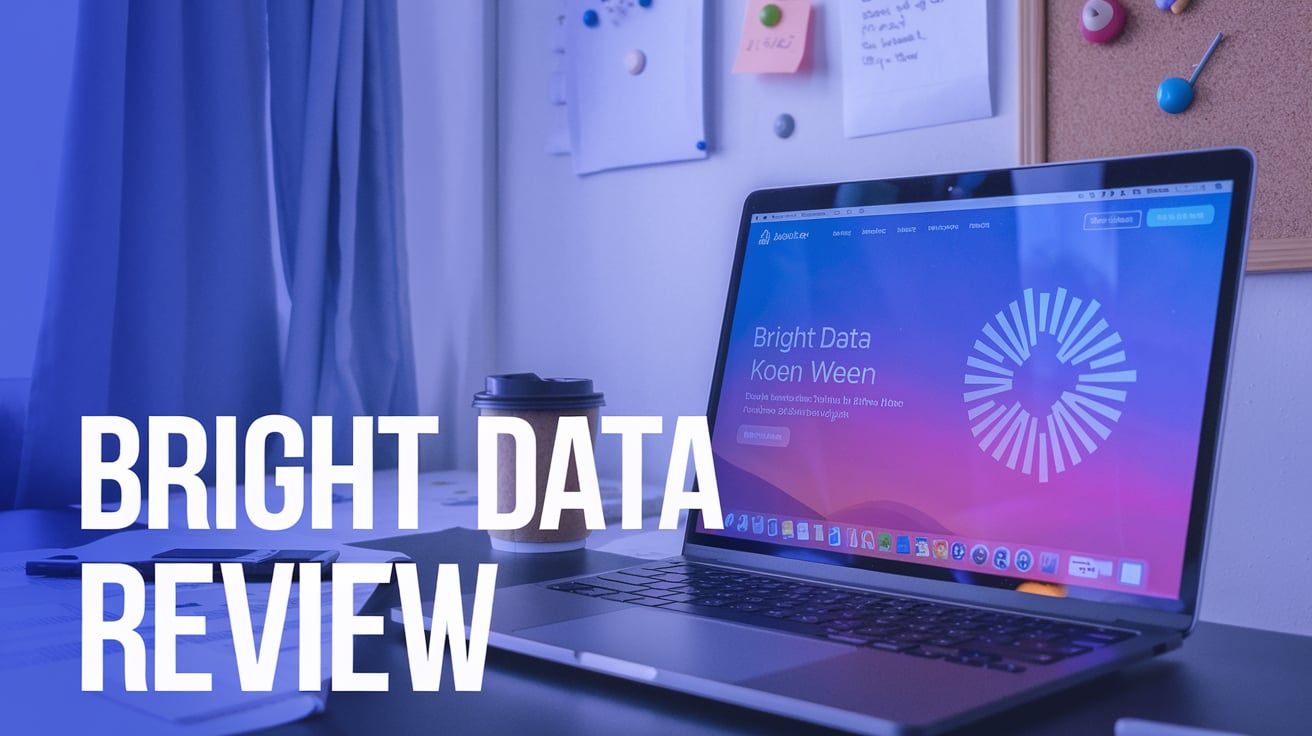
Bright Data, formerly known as Luminati, has positioned itself as a leading Israeli provider of data collection infrastructure since its establishment in 2014. Owned by the UK-based equity firm EMK Capital, the company has undergone rebranding to distance itself from negative associations. Despite its wide range of offerings, including proxy servers, data collection APIs, scraper development tools, and pre-collected data sets, Bright Data faces stiff competition in the evolving proxy market.
General Information
| Aspect | Description |
|---|---|
| Company Name | Bright Data (formerly Luminati Networks) |
| Services | Data collection solutions, proxy network |
| Proxy Network | Millions of IP addresses for efficient data gathering |
| Data Collection | Web scraping, data mining |
| Use Cases | Market research, competitive analysis, business intelligence |
| Industries | E-commerce, travel, advertising, finance |
| Compliance | Emphasis on legal and ethical considerations |
| Rebranding | From Luminati Networks to Bright Data in 2020 |
Bright Data caters to diverse use cases such as web scraping for price comparison, SEO, and even sneaker copping. As a proxy provider, it distinguishes itself by being stringent about acceptable use cases, avoiding questionable activities. The company pioneered residential proxies when competitors predominantly sold datacenter IPs, gaining a competitive edge. Despite controversies, including issues with Hola VPN and the Mobdro app, Bright Data remains a prominent choice for universities and Fortune 500 companies.
Bright Data Datacenter Proxies
Bright Data offers various configurations for datacenter proxies, including fixed number addresses (shared or dedicated), Bright Lite (rotating proxy pool for entry-level tasks), and premium rotating proxy pool with IPs for accessing protected e-commerce, social media, and travel websites.
Features
| Feature | Description |
|---|---|
| Large Proxy Network | Access to a wide range of IP addresses. |
| High-Speed Connections | Suitable for tasks requiring rapid data retrieval. |
| IP Rotation | Capability to switch between different IP addresses. |
| Global Coverage | Access websites from various geographic locations. |
| Scalability | Designed to be scalable for small to large-scale projects. |
| API Integration | API access for seamless integration into applications. |
| Session Control | Ability to control and maintain sessions for continuity. |
| Data Security and Compliance | Emphasis on legal and ethical considerations. |
| Unified System with Wide Location Coverage | Provides a unified system with extensive location coverage. |
| Unlimited Threads and SOCKS5 Support | Supports unlimited threads and SOCKS5 for versatile usage. |
| Rotation Options | Rotation options available for all products. |
| Pay per IP Service | Allows specifying proxy locations with a pay-per-IP service model. |
| Dedicated Proxies for Specific Domains | Option for dedicated proxies tailored for specific domains. |
| Free 100% Uptime Toggle | Toggle for automatic replacement, ensuring 100% uptime. |
Pricing Plans
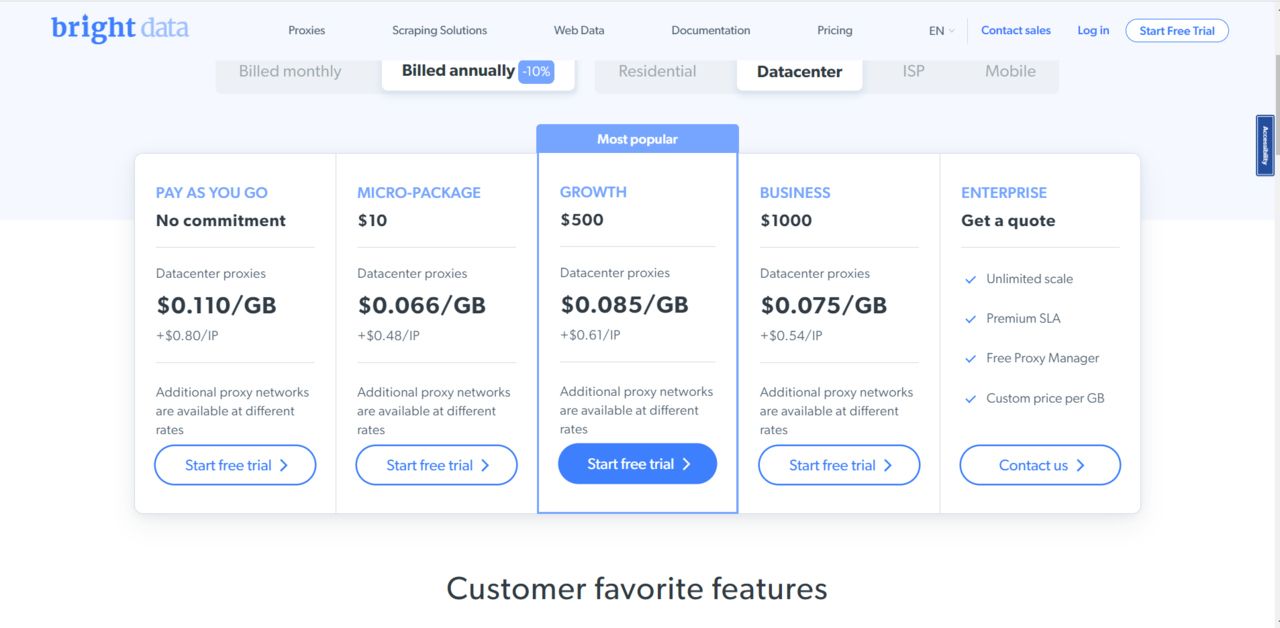
- Pricing based on proxy count and traffic use
- Competitive pricing for traffic-based datacenter proxies
Performance Benchmarks
Test #1: Infrastructure Performance (Shared Pay per IP Proxies)
In Proxyway's evaluation, 50,000 shared proxies based in the US underwent 50,000 connection requests from a computer in Germany. Targeting a global CDN, the shared proxies exhibited effective performance with a high success rate. The majority of requests reached the target, demonstrating reliability. Latency remained relatively low, with response times consistently below one second, aligning with results from competitors like Smartproxy and Rayobyte.
Test #2: Download Speed
To gauge download speed, Proxyway tested 10 shared and 10 dedicated IPs using DigitalOcean's 100 MB NYC benchmark. Both proxy types demonstrated impressive download speeds, nearly matching the baseline download speed without proxy servers. This suggests that Bright Data's proxies possess ample bandwidth for demanding tasks, including streaming and other data-intensive activities.
Test #3: Performance with Popular Targets
In the examination involving approximately 2,600 connection requests to various targets using US proxies, Proxyway observed notable trends. Bright Data encountered challenges with Amazon, where 35% of requests with dedicated proxies and 44% with shared proxies faced blocks. This indicates potential issues with specific IPs being blacklisted by Amazon. However, performance with other websites, except for Home Depot, remained generally acceptable.
Bright Data Residential Proxies
Bright Data boasts a network of 72 million monthly residential IPs, sourced through various channels, including Bright VPN, EarnApp, and developers integrating Bright SDK into their software.
Features
| Feature | Description |
|---|---|
| IP Diversity | Residential proxies typically come from a variety of residential devices and networks, providing a diverse range of IP addresses. |
| Anonymity | Residential proxies offer a level of anonymity by masking your actual IP address with one from a residential network. |
| Geographic Targeting | Residential proxies often allow you to choose IP addresses from specific geographic locations, enabling you to access region-restricted content or conduct location-based testing. |
| Rotation | Proxy rotation is a common feature, allowing users to switch between different IP addresses to avoid detection and prevent blocking. Customizable rotation options using the proxy manager. |
| Compatibility | Residential proxies are designed to work with various protocols and applications, making them suitable for a wide range of use cases, such as web scraping, SEO monitoring, and more. |
| High-Quality IPs | Providers often claim to offer high-quality residential IPs that are less likely to be flagged as proxies, improving reliability and success rates for various online activities. |
| Security | Some providers may include security features to protect your online activities and ensure the safety of your data while using their proxies. |
| Scalability | Services may offer scalable solutions to accommodate the changing needs of users, from individual users to large enterprises. |
| Granular Location Targeting | Ability to target locations with filtering up to ASN and ZIP code level. |
| Customizable Rotation | Custom rotation options using the proxy manager for personalized proxy usage. |
| SOCKS5 Protocol Support | Support for the SOCKS5 protocol with specific conditions for enhanced flexibility. |
| Cached Pages | Unique features like receiving cached pages for cost reduction. |
Pricing Plans
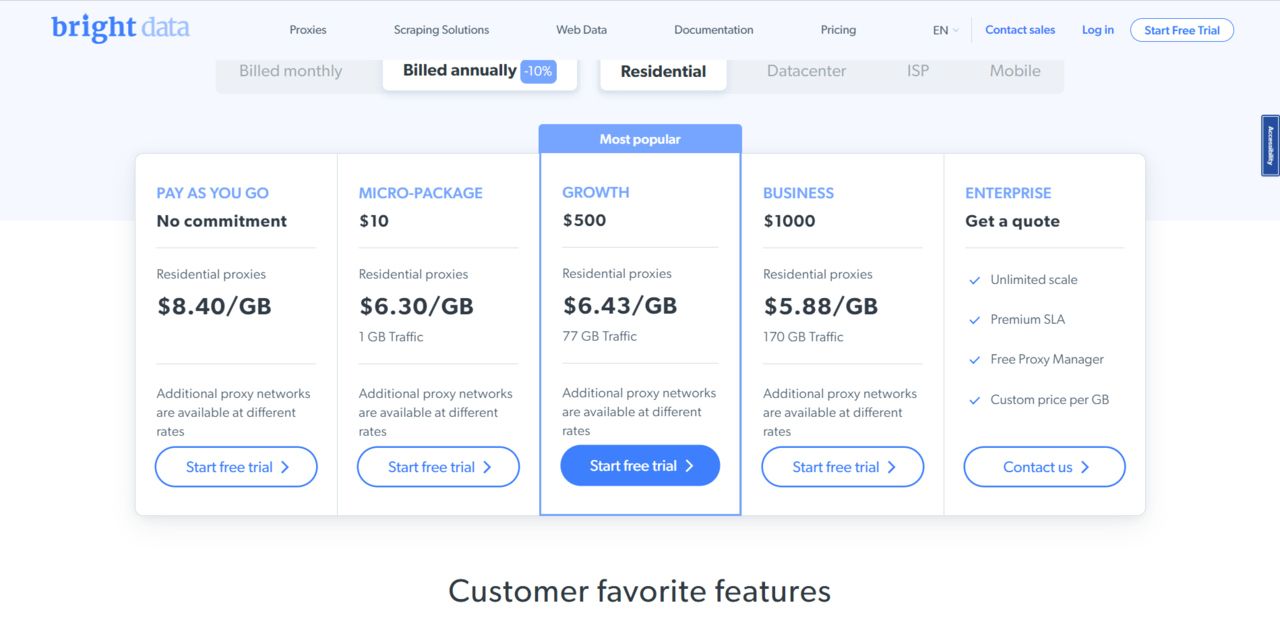
- Flexible usage without commitment or discounted plans
- Pricing based on traffic use, with additional charges for features
- Affordability varies based on configuration and toggles enabled
Performance Benchmarks
Test #1: Pool Size & Composition
Proxyway conducted extensive tests, including 1 million requests over 21 days using the unfiltered pool, 500,000 requests over 14 days using country-specific pools, and 140,000 connection requests over 7 days using the Australian pool, to delve into the composition of Bright Data's residential proxy pool. The results highlighted a large and balanced proxy pool, particularly abundant in American IPs. NetNut was the only competitor with more American IPs, albeit using datacenter-based proxy servers.
Test #2: Infrastructure Performance
Utilizing the same parameters as the pool test, Proxyway assessed the infrastructure performance of Bright Data's residential proxies. The computer was located in Germany, targeting a global CDN. The infrastructure demonstrated exceptional performance, ensuring over 99% success rate in all but one location. Average response times ranged between 0.5 and 1.6 seconds, outperforming many competitors. Notably, Bright Data's results remained relatively consistent over a year, while some major competitors showed significant improvements.
Test #3: Performance with Popular Targets
Executing around 2,600 connection requests to popular websites using US-filtered proxies, Proxyway examined performance in a real-world web scraping scenario. The residential proxies exhibited robust results across all tested websites, except for Google, which is intentionally blocked by Bright Data. The performance was competitive when compared to major competitors in the residential proxy segment.
Bright Data Mobile Proxies
Bright Data manages a network of 7 million monthly mobile IPs, offering similar features to its residential product.
Features
| Feature | Description |
|---|---|
| Residential IP Addresses | Uses residential IP addresses assigned to mobile devices. |
| Rotating IP Addresses | Automatically switches to a different IP address at regular intervals. |
| Geo-Location Options | Allows users to choose proxy servers from specific geographic locations. |
| Session Persistence | Maintains the same IP address for the duration of a session. |
| User-Agent Spoofing | Enables customization of the User-Agent header to mimic different devices and browsers. |
| High-Quality Connections | Provides high-quality, low-latency connections for real-time or reliable applications. |
| Precise IP Filtering | Offers precise filtering options for IP addresses. |
| Rotation and Customizable Sessions | Supports automatic rotation of IP addresses and customizable sessions. |
| SOCKS5 Protocol Support | Supports the SOCKS5 protocol for enhanced security and functionality. |
| Unique Feature: Request Caching | Introduces unique features like request caching for optimized performance. |
Pricing Plans
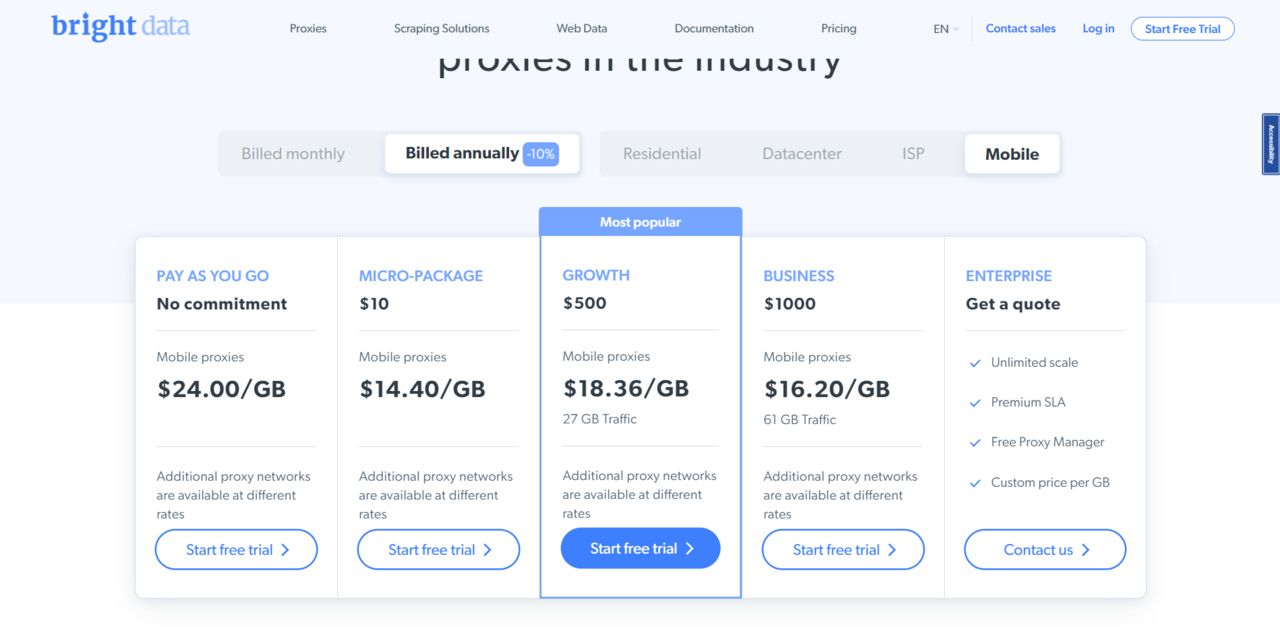
- Usage without subscription or discounted plans for committed usage
- Traffic-based pricing with additional charges for premium features
Performance Benchmarks
Test #1: Pool Size & Composition
Proxyway ran tests with 280,000 requests over 14 days for the unfiltered pool and country pools, as well as 140,000 connection requests over 7 days for the Australian pool, to explore the size and composition of Bright Data's mobile proxy pool. Surprisingly, the pool wasn't as large as expected, with fewer American proxies than anticipated. Competitor SOAX, despite claiming a smaller proxy network, returned more unique IPs.
Test #2: Infrastructure Performance
Employing the same parameters as the pool test, Proxyway assessed the infrastructure performance of Bright Data's mobile proxies. The computer was in Germany, and the target was a global CDN. While the unfiltered pool showed strong performance, the mobile proxies filtered for American IPs experienced challenges, particularly with a 502 error indicating a lack of available IPs at the time. Overall, Bright Data's performance was good but not consistently the best in the market.
Test #3: Performance with Popular Targets
Executing approximately 2,600 connection requests to popular websites using US-filtered proxies, Proxyway examined how Bright Data's mobile proxies performed in real-world scenarios. The issue observed in the US proxies (limited available IPs) persisted, with between half and two-thirds of requests failing. While this may have been an outlier, further testing would be needed to confirm typical performance.
How to Use Bright Data
Registration Process
Commencing your journey with Bright Data involves a meticulous registration process. Providing your first and last name, work email, and company size is the initial step. For more specialized requirements, scheduling a call is an option. The login methods extend beyond traditional credentials, incorporating Google and Okta SSO. Notably, compliance is a key focus, especially when utilizing peer-to-peer proxy networks. While KYC for over 200 websites via residential proxies has been simplified, a complete KYC process is imperative for others. This involves presenting personal details, funding the account, and patiently waiting up to three days for verification.
Navigating the Dashboard
Bright Data's dashboard, once intricate, has undergone refinement to feature two principal sections for product management, one for billing, and another for account controls. Although complexities persist, the dashboard empowers users to perform an array of tasks. These include adding funds, configuring and authorizing proxies, scrutinizing usage statistics, and reaching out to support. Security takes precedence, with provisions for team access levels, 2FA setup, event logs, and automated notifications.
Subscription Management: Zones and Plans
Diverging from conventional plans, Bright Data introduces a unique system called Zones. Acting akin to plans, users can create multiple zones for each proxy type, enabling separate zones with identical configurations. Spending limits, based on either traffic or monetary parameters, can be assigned to each zone, allowing meticulous tracking of monthly expenditures. In contrast to other providers, Bright Data does not segregate plans for each product; instead, a plan encompasses all services contingent on the committed amount.
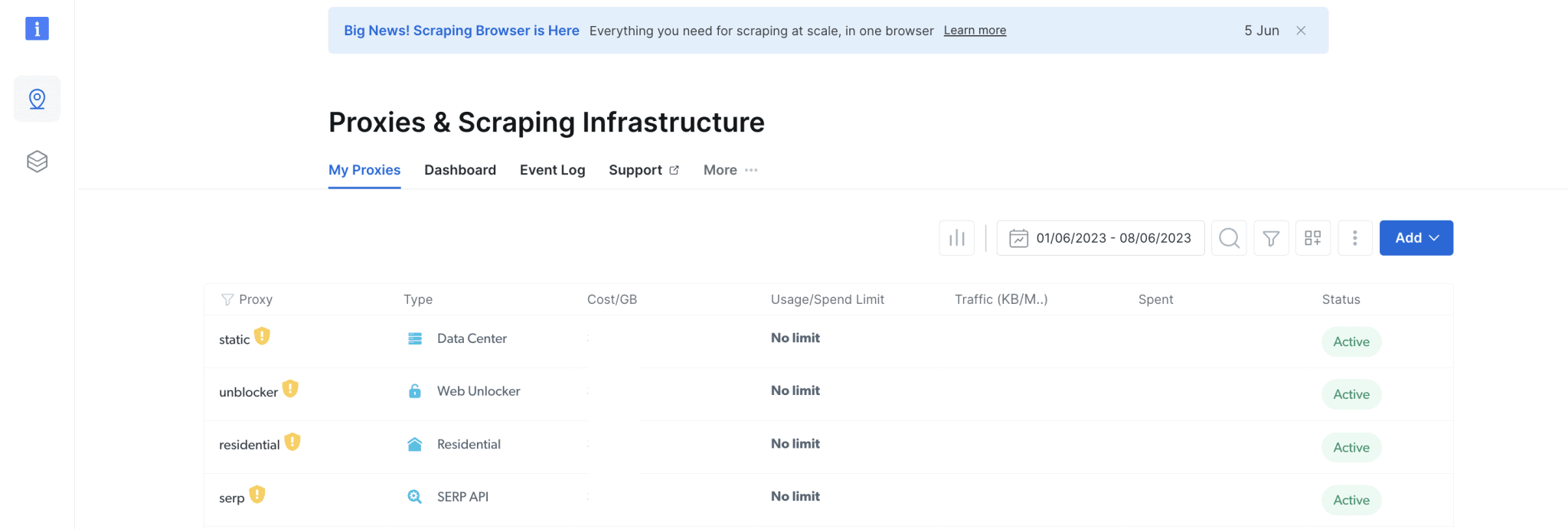
The Billing section provides an exhaustive breakdown of subscription details, presenting current balances, active plans, invoices, and payment method configurations. A visual cost explorer aids users in comprehending their financial outlays.
Proxy Management: Initiating and Integrating Zones
To initiate any action concerning proxies within Bright Data's platform, the creation of a zone is a prerequisite. This entails selecting a proxy type, specifying additional permissions if required, and navigating through a configuration wizard that estimates costs based on user choices. The final step involves naming the zone and confirming its creation.
Integration Methods:
API (Super Proxies):
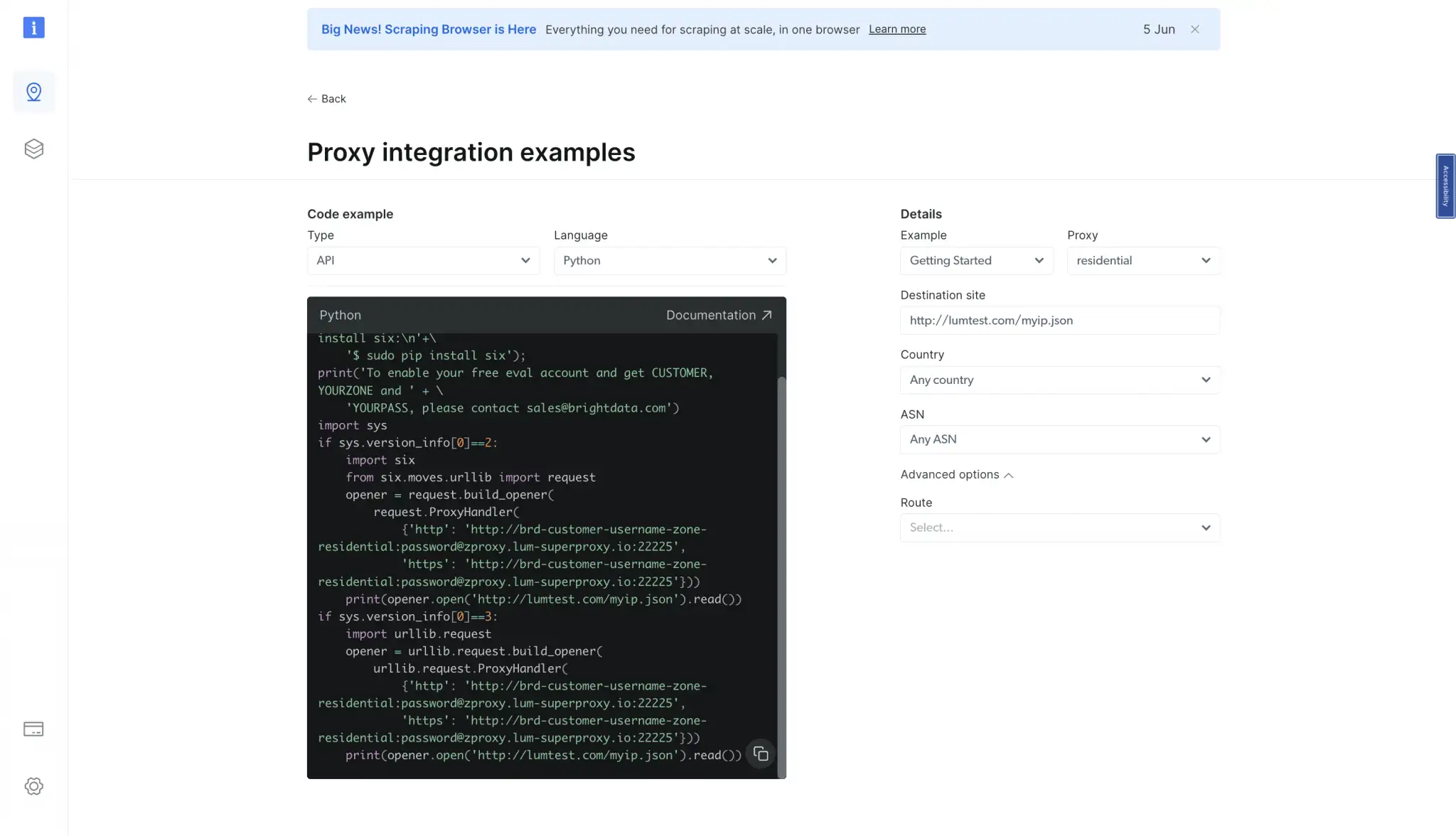
- An interactive widget generates gateway addresses in the hostname:port format.
- Dynamic code samples are provided for major programming languages.
- A unified system necessitates even Pay per IP datacenter proxies to connect through gateway servers, enhancing complexity while allowing for static sessions or specific IP pinpointing.
Proxy Manager:
- An open-source tool, available across operating systems and in the cloud.
- Enhances various aspects of proxy management, offering detailed live logs, improved rotation settings, and support for SOCKS5.
- Introduces the Proxy Waterfall feature, optimizing proxy network usage through progressive attempts with different proxy types.
Browser Extension:
- A customizable Google Chrome extension.
- Allows users to change their IP address based on a Zone or location.
- Suited for manual scraping, the extension enables settings such as sticky sessions and modification of request headers.
Usage Tracking: Comprehensive Statistics
A substantial emphasis is placed on detailed statistics within Bright Data. Users can access statistics through various avenues, including a quick toggle in the Zones page, a tab dedicated to usage statistics per proxy network with customizable graphs, and statistics for each zone within its settings. Proxy Manager users have the added benefit of displaying statistics directly on the dashboard. Flexible filtering options are provided, allowing users to scrutinize specific time periods and metrics encompassing bandwidth expenditure, request volume, and error rates.
Public API: Granular Control
Bright Data stands out by offering a comprehensive API for the programmatic management of proxy servers. The API provides unparalleled granularity, enabling users to exert meticulous control over diverse aspects of proxy server administration.
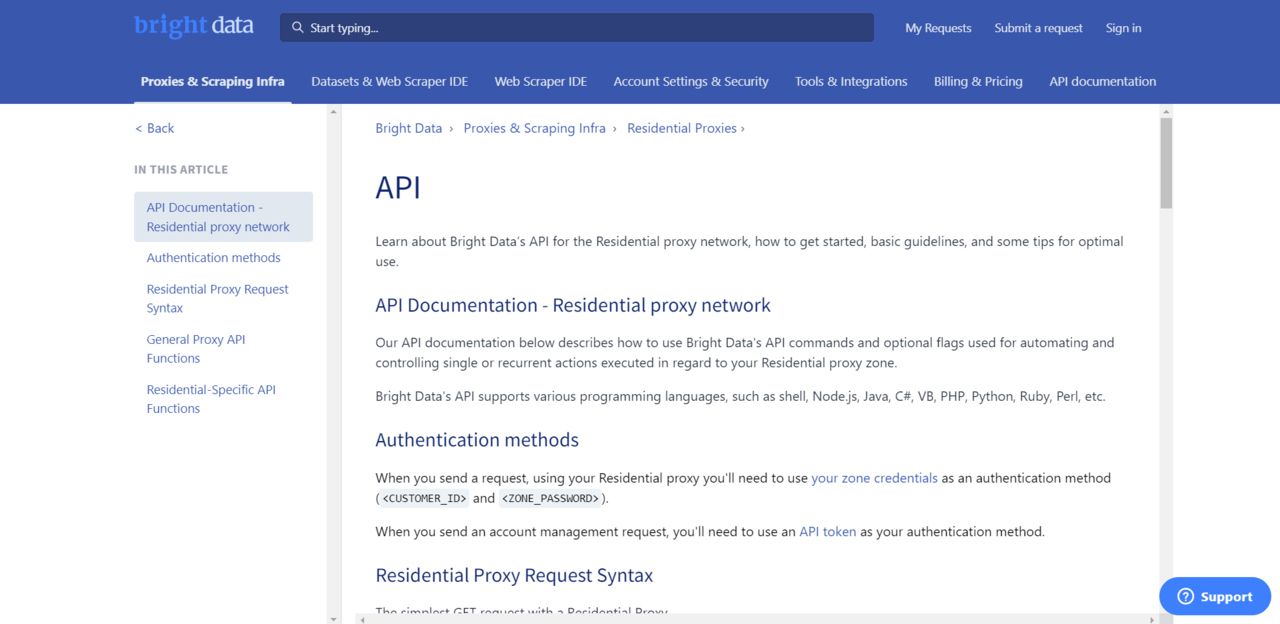
Documentation: Navigating the Complexity
In the realm of such intricate services, comprehensive documentation is imperative, and Bright Data delivers on this front. The FAQ page serves as an initial resource, addressing basic queries about service usage. Webinars, focused on specific concerns such as reCAPTCHA avoidance and browser automation, cater to more nuanced topics. Additionally, a video-based learning hub is available, although it appears somewhat outdated in comparison.
Hands-On Support: Quick and Effective
In the event users find themselves in need of assistance, Bright Data provides a ticket system accessible directly from the dashboard. Customers committed to a plan receive the additional support of an account manager. Communication channels include WhatsApp, Telegram, and even phone support. Notably, response times are swift, with emails garnering replies within an average of 14 minutes. While account managers respond even faster, it's important to note that they do not operate round the clock.
In essence, navigating the intricate ecosystem of Bright Data may initially seem complex. However, armed with this comprehensive guide, users can confidently explore and harness the full potential of Bright Data's proxy management tools.
Conclusion
In essence, Bright Data, formerly known as Luminati, stands as a robust and versatile proxy provider with a comprehensive range of solutions. With its origins dating back to 2014, the company has evolved into a prominent Israeli data collection infrastructure provider. Acquired by the UK-based equity firm EMK Capital, Bright Data has expanded its offerings beyond proxies, aiming to be a comprehensive source for web data.
The company caters to various use cases, including web scraping for price comparison, SEO, and niche activities. Despite controversies, such as associations with Hola VPN and the Mobdro piracy app, Bright Data emphasizes ethical proxy sourcing and usage. They actively vet customers to prevent abuse, showcasing a commitment to maintaining ethical standards in the industry.
Bright Data's proxy solutions cover a spectrum of needs, from datacenter proxies with diverse configurations to a vast network of residential proxies boasting 72 million monthly IPs. Additionally, the company manages 7 million monthly mobile IPs, sharing features with residential proxies.
As of 2023, Bright Data has received recognition for its innovation, being awarded the Most Innovative Provider. However, users should carefully consider their specific needs and preferences, especially in light of potential performance variations and the evolving landscape of the proxy market. With a comprehensive guide, users can confidently explore and harness the full potential of Bright Data's proxy management tools.

Frequently Asked Questions
1. What services does Bright Data offer?
Bright Data offers a range of data collection infrastructure services, including datacenter proxies, residential proxies, and mobile proxies. They provide proxy servers, data collection APIs, scraper development tools, and pre-collected data sets.
2. What are the key features of Bright Data's datacenter proxies?
Bright Data's datacenter proxies come in various configurations, including fixed number addresses (shared or dedicated), Bright Lite (rotating proxy pool for entry-level tasks), and a premium rotating proxy pool for accessing protected e-commerce, social media, and travel websites.
3. What challenges did Bright Data face with datacenter proxies in real-world scenarios?
In Proxyway's examination involving approximately 2,600 connection requests to various targets using US proxies, Bright Data encountered challenges with Amazon, where a significant percentage of requests faced blocks. However, performance with other websites, except for Home Depot, remained generally acceptable.
4. How many residential IPs does Bright Data have in its network?
Bright Data boasts a network of 72 million monthly residential IPs, sourced through various channels, including Bright VPN, EarnApp, and developers integrating Bright SDK into their software.
For further reading, you might be interested in the following:

